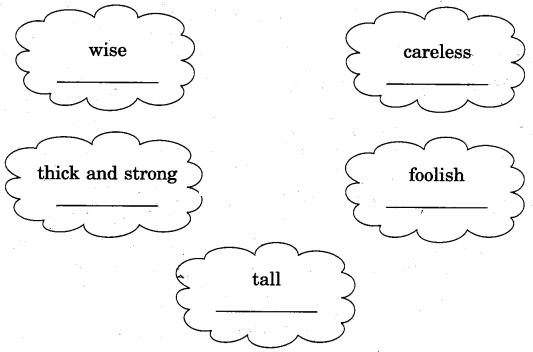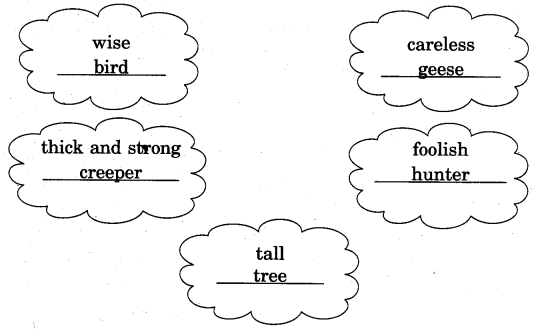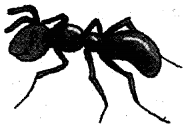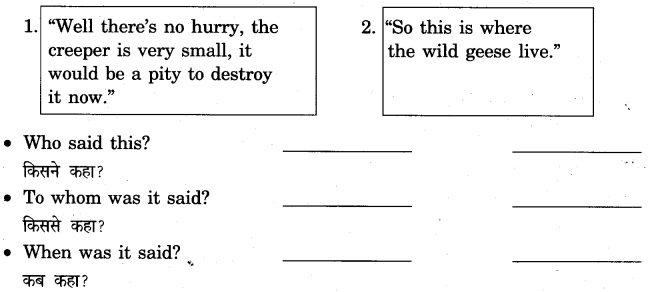NCERT Solutions for Class 5 English Unit 2 Chapter 2 Flying Together
Question 1.
Where did the geese live?
हंस कहाँ रहते थे?
Answer:
The geese lived in the leafy branches of a tall tree.
Question 2.
Why did the old bird advise the other birds to destroy the creeper?
वृद्ध पक्षी ने अन्य पक्षियों को बेल नष्ट करने की सलाह क्यों दी?
Answer:
The old bird advised the other birds to destroy the creeper because it could help a hunter to climb up the tree and kill all of them.
Question 3.
Why did the geese cry, “Help Help”?
हंस क्यों चिल्ला रहे थे, “बचाओ, बचाओ”?
Answer:
The geese cried for help because they were trapped in the hunter’s net.
Question 4.
What did the hunter do when he thought that the geese were dead?
जब शिकारी को पता चला कि सभी हंस मरे हुए हैं तो उसने क्या किया?
Answer:
He threw them out of the net one by one.
Question 5.
Why did the geese pretend to be dead?
हंस मरने का दिखावा क्यों किए?
Answer:
The geese pretended to be dead so that the hunter would leave them safely.
Question 6.
Describe one incident when you got into trouble because you did not do your work on time.
Answer:
I had to participate in a quiz contest to be held on the occasion of Children’s Day. As there was one week to come to that auspicious day, I got relaxed and didn’t touch any of the reference books. My mother kept on telling me to consult a few books for the contest but I didn’t pay any attention to her advice. I had full confidence in myself. I thought the day before the contest would be enough for the preparation. When that day came, I got severe headache. I could not go through any book. Although I participated in the contest, I did nothing. I felt ashamed of myself.
State whether the following statements are True or False.
1. The tree was the house of a flock of parrots.
2. The wise old bird wanted the creeper to be destroyed.
3. The hunter climbed the tree with the help of a ladder.
4. When caught in the net the foolish birds began to weep.
5. The wise old bird helped them to escape.
Answer:
1. False
2. True
3. False
4. True
5. True
Let’s Listen
Listen to the following paragraph.
निम्नलिखित अनुच्छेद को पढ़िए।
The Ant and the Dove
On his way home, an ant saw a sparkling fountain. He crawled on to its wall to take a closer look.
Suddenly he slipped and fell into the water. He gurgled and panicked and waved his legs in the air. “Help! I can’t swim.” he cried. Luckily, just at that moment, a friendly dove flew by. She saw that the tiny ant was drowning and quickly flew to a nearby tree.
She pulled off a leaf and let it glide down to the ant. “Here you are,” she cooed, and flew away. (Adapted from Aesop’s Fables)
(i) Why do you think the dove helped the ant?
(ii) How do you think the ant felt on finding the leaf?
(iii) Have you ever been in trouble like the ant? Did anyone help you?
Answer:
(i) I think the dove helped the ant because she was friendly by nature and so took pity on the tiny ant.
(ii) On finding the leaf the ant would have felt very happy. She would have also felt thankful to the dove.
(iii) Once I got lost in a fair. I got panicked. I requested several persons, to give me their mobile for a while so that I may call to my father. But no one helped me. In the last I went to a policeman and gave him my father’s mobile number. The policeman contacted with my father and told him to pick me up from the main gate of the compound where the fair was held.
Let’s Talk
Question 1.
Work in pairs.
जोड़े बनाकर काम कीजिए।
Ask your friend questions about all the things he does.
Use question words such as where, what, how, who, when, why. One is done for you.
अपने मित्र से उन सभी चीजों के बारे में प्रश्न पूछिए जो वह करता है।
Where, what, how, who, when, why जैसे प्रश्नावाचक शब्दों का प्रयोग कीजिए| आपकी सहायता के लिए एक किया गया है।
Anu : I watch TV in the evening.
Amit : When do you watch TV?
Anu : I play games.
Amit : __________
Anu : I collect stamps.
Amit : ________
Anu
Anu : I play in the ground.
Amit : __________
Anu : On Sunday I go shopping.
Amit : ___________
Answer:
Anu : I watch TV in the evening.
Amit : When do you watch TV?
Anu : I play games.
Amit : What do you play?
Anu : I collect stamps.
Amit : What do you collect?
Anu : I play in the ground.
Amit : Where do you play?
Anu : On Sunday I go shopping.
Amit : What do you do on Sunday?
Or
When do you go shopping?
Question 2.
Answer these questions about yourself.
अपने बारे में इन प्रश्नों के उत्तर दीजिए।
(i) What is your name?
(ii) What languages do you speak?
(iii) How old are you?
(iv) Which is your favourite food?
(v) Where did you go yesterday?
(vi) Which country do you belong to?
(vii) When do you go to sleep?
(viii) Why do you drink milk?
Answer:
(i) My name is Anshu.
(ii) I speak Hindi and English.
(iii) I am ten years old.
(iv) My favourite food is curry and chawal.
(v) Yesterday I went to museum.
(vi) I belong to India.
(vii) I go to sleep at 10 p.m.
(viii) I drink milk to get strong.
Question 3.
In groups of five discuss what you would do if you were caught in the following situations.
- Your friend falls in the playground and is hurt….
- You are trapped in a fire…
- You are stuck in a traffic jam…
Answer:
- I’ll lift him and give him first aid.
- I’ll call for help.
- I’ll wait patiently for the jam to be cleared.
Let’s Write
Question 1.
The words in the clouds describe something or someone in the story. Name them in the blanks provided.
बादलों में जो शब्द दिए गए हैं वे किसी चीज या व्यक्ति का वर्णन करते हैं। दिए गए रिक्त स्थानों में उनका नाम लिखिए।
Answer:
Make sentences of your own with the words given in the clouds.
बादलों में दिए गए शब्दों से वाक्य बनाइए।
- Wise : The king was very wise.
- Careless : We should not be careless.
- Thick and strong : The creeper was thick and strong.
- Foolish : The foolish can be trapped easily.
- Tall : A tall building was standing in front of the playground.
Question 2.
Here are some answers about the given picture.
(i) The colour of the ant is black.
(ii) It lives on land.
(iii) It has two long antennae.
(iv) It crawls on the ground.
(v) It eats sugar.
Now frame questions for the above answers.
अब ऊपर दिए गए उत्तरों के लिए प्रश्न बनाइए।
Answer:
(i) What is the colour of the ant?
(ii) Where does it live?
(iii) How many antenne does it have?
(iv) How dose it move on the ground?
(v) What does it eat?
Question 3.
Fill in the blanks with the prepositions such as to, at, off, on, in, into, with. One has been done for you.
(i) This tree was the home of a flock of wild geese.
(ii) He noticed the creeper ______ the foot of the tree.
(iii) “It would be a pity ______ destroy it now.”
(iv) As they flew ______ the tree they were trapped.
(v) The boy ran ______ the dog.
(vi) The frogs jumped ______ the well.
(vii) The girl was thrilled ______ see her new bicycle.
(viii) The birds were caught ______ the net.
(ix) The children walked ______ the bridge.
Answer:
(ii) at
(iii) to
(iv) into
(v) with
(vi) into
(vii) to
(viii) in
(ix) over
Question 4.
Complete the paragraph with suitable words from the box.
बॉक्स में से उपयुक्त शब्द चुनकर अनुच्छेद पूरा कीजिए।
One day, as I was walking ______ the bank of the river, I saw my friend running ______ the field. He was calling my name and waving ______ me. I stopped and waited. ______ sometime he reached where I was standing.
He said, “I went all ______ the town looking for you. I have some exciting news to share ______ you. Do you remember the old house ______ the neem tree? Guess who is moving ______ house? Janak Das, the great magician. Now we can learn lots of magic tricks ______ him.”
Answer:
along, across, to, After, around, with, next to, into, from.
Question 5.
Fill in the blanks given below with question words.
नीचे दिए गए रिक्त स्थानों को प्रश्नवाचक शब्दों से भरिए।
For example, where do you live?
(i) ______ do you play?
(ii) ______ do you get up?
(iii) ______ do you have for breakfast?
(iv) ______ do you go to school?
(v) ______ do you like best in the school-game, art or music?
(vi) ______ is your birthday?
(vii) ______ do you want for your birthday?
Answer:
(i) What
(ii) When
(iii) What
(iv) When
(v) What
(vi) When
(vii) What
Question 6.
Reference to context.
Draw pictures of the speakers of the above lines.
उपरोक्त पंक्तियों के वक्ताओं के चित्र बनाइए।
Answer:
1.
- the geese
- to the old wise bird .
- when the old wise bird told them to destroy the newly-grown creeper.
2.
- the hunger
- to himself
- when he came to the tree in the forest.
Fun Time
Students should themselves draw the pictures.
Proverbs are short, wise sayings. For example Look before you leap. This means that we should think carefully before we take any action. Here are some popular English proverbs. Read them aloud together and discuss what each could mean.
- Old is gold.
- As you sow so shall you reap.
- Unity is strength.
- United we stand divided we fall.
- A friend in need is a friend indeed.
कहावतें संक्षिप्त और ज्ञानवर्धक होती हैं। उदाहरण के लिए-छलांग लगाने से पहले देखो। इसका अर्थ है कि कोई काम करने से पहले हमें अच्छी तरह सोच-विचार लेना चाहिए। यहाँ पर कुछ लोकप्रिय अंग्रेजी कहावतें दी जा रही हैं। उन्हें एक साथ जोर से पढ़िए और चर्चा कीजिए कि प्रत्येक का क्या अर्थ हो सकता है।
Answer:
- Old is gold-One who is in my contact from a long time is more reliable or worthier than others.
- As you sow so shall you reap—You will have to bear the consequences (good or bad) of your action.
- Unity is strength–If we are together we will be strong enough to overcome any problem.
- United we stand divided we fall—If we are together we win, if not we lose.
- A friend in need is a friend indeed—A friend who gives you help when you need is a true friend.
Question 2.
Look at this proverb : A stitch in time saves nine.
(i) Discuss what it means. Can you think of events/happenings in life where this idiom can be used?
(ii) Write down your story or the event. Then read the paragraph to your neighbour.
इस कहावत पर नजर डालिएः समय पर कोई काम करने से हम बहुत तरह की परेशानियों से बच जाते हैं।
(i) चर्चा करें कि इसका अर्थ क्या होता है। क्या आप अपने जीवन की उन घटनाओं के बारे में सोच सकते हैं, जहाँ इस कहावत को प्रयुक्त किया जा सकता है।
(ii) अपनी कहानी अथवा घटना को लिखें। उसके बाद अनुच्छेद को अपने पड़ोसियों के सामने पढ़िए।
The Clap Word Game
Question 3.
Let us play the clap word game.
Where the word produces one should, clap once, as in ‘creep’.
Clap twice if the word can be broken up into two syllables as in cree-per, and thrice as in to-mo-rrow.
Answer:
Do it yourself with the help of your teacher.